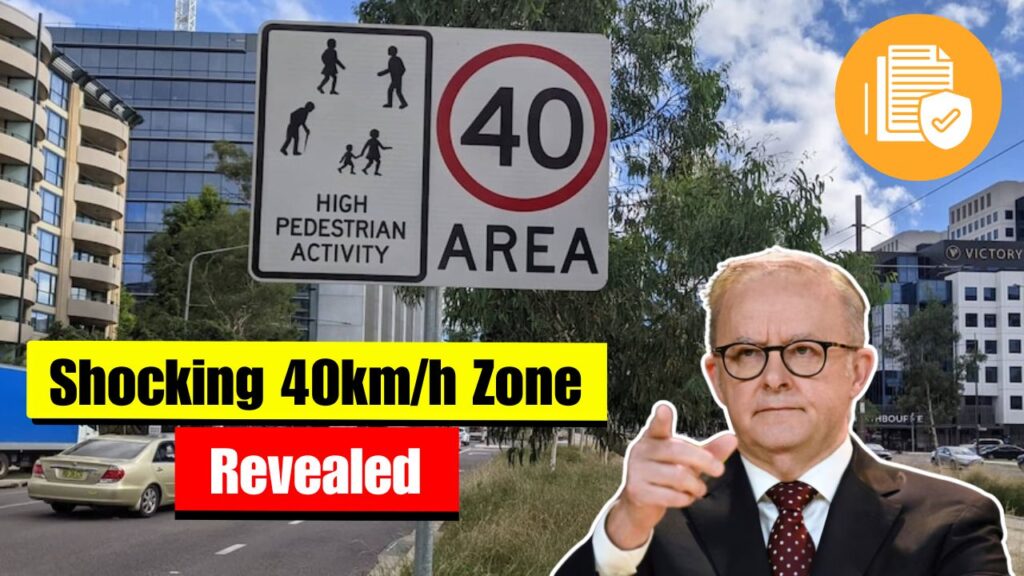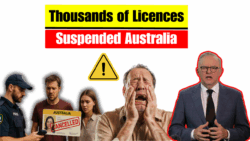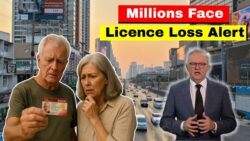The New South Wales authorities have officially rolled out new 40 km/h speed limits across several busy Sydney streets starting this month. The move comes as part of an intensified effort to reduce pedestrian accidents and improve urban traffic safety. According to Transport for NSW, the rule aims to create a safer environment in areas with high foot traffic such as school zones, markets, and shopping districts. Drivers are being urged to follow the updated speed control regulations strictly, as mobile speed cameras and traffic wardens have already been deployed to monitor compliance.

Why Sydney Introduced 40 km/h Zones
The new speed rule is part of Sydney’s long-term pedestrian safety strategy, which focuses on protecting vulnerable road users, especially children and seniors. Data from previous years showed that most urban accidents occurred in areas where vehicles moved above 50 km/h. By reducing the limit to 40 km/h, the government aims to lower the risk of fatal crashes by almost 40%. These zones have been introduced primarily in Central Business District (CBD) areas, near schools, hospitals, and major public transport hubs. The authorities emphasize that this initiative isn’t just about penalties—it’s about saving lives and ensuring smoother urban mobility.
Areas and Streets Affected by the New Speed Rule
As of November 2025, multiple Sydney regions have been added to the revised speed zone list. Popular areas such as George Street, Pitt Street, and parts of Parramatta Road have seen new signboards and upgraded camera systems. The NSW Transport Department has also identified several high-risk intersections where the change is expected to have the biggest impact. Clear road markings and LED signs have been installed to alert drivers in advance. Residents have largely welcomed the decision, saying it brings much-needed order to pedestrian-heavy areas during rush hours.
Fines and Enforcement Under the New Rules
The enforcement of the 40 km/h rule will be strict, with fines ranging from $200 to over $2,000 for repeat offenders. Speed cameras in these zones are now programmed to detect even minor violations. The NSW Police will also conduct random checks, especially during peak commuting hours. Drivers caught speeding in school or pedestrian zones could face immediate license suspension. The government has launched awareness campaigns to ensure motorists are fully informed before entering restricted areas. Officials have stated that penalties are meant to deter reckless driving rather than simply generate revenue.
Impact on Drivers and Pedestrians
The impact of these traffic rule changes is already being noticed in trial areas. Pedestrian safety metrics show fewer near-miss incidents, while traffic flow remains relatively smooth. Many drivers initially complained about the reduced limit, but most agree that the pedestrian protection measure is a positive step. Over time, experts expect lower insurance claims and a reduction in urban accident rates. The move aligns with Sydney’s goal of becoming a zero-fatality city by 2030, focusing on shared responsibility between drivers, cyclists, and walkers for safer roads.
| Area / Street | Old Speed Limit | New Speed Limit | Implementation Date |
|---|---|---|---|
| George Street (CBD) | 50 km/h | 40 km/h | November 2025 |
| Pitt Street | 50 km/h | 40 km/h | November 2025 |
| Parramatta Road | 60 km/h | 40 km/h | December 2025 |
| King Street (Newtown) | 50 km/h | 40 km/h | December 2025 |
FAQ 1: When did Sydney’s new 40 km/h rules start?
The new rules started officially in November 2025 across key Sydney streets.
FAQ 2: What is the fine for overspeeding in a 40 km/h zone?
Drivers can be fined between $200 and $2,000 depending on the severity and number of offenses.
FAQ 3: Are school zones part of the 40 km/h rule?
Yes, most school and pedestrian-heavy zones are included in the new limit enforcement areas.
FAQ 4: How are authorities monitoring compliance?
Authorities are using mobile speed cameras and random police checks to ensure full compliance.






